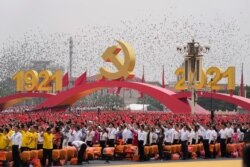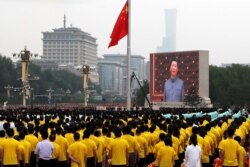In six months, throngs of foreign media will arrive in Beijing for the 2022 Winter Olympics. They may be welcomed by a wide-ranging Chinese government campaign to foment public anger against Western journalists, who have been increasingly harassed because of their reporting.
Chinese state media, diplomats, and other officials have conducted a months-long effort to stoke hostility toward reporters and outlets they accuse of spreading lies about China. Recently, Beijing has targeted the BBC, which has done extensive reporting on China's reeducation camps for Uyghur Muslims in the western region of Xinjiang.
But reporters from many other publications have been caught in the fray. Last month, angry crowds surrounded and briefly detained a pair of German and U.S. journalists reporting on floods in the Chinese province of Henan. The locals accused the reporters of spreading anti-China rumors. Since then, several news outlets reported receiving death threats and other intimidating phone calls.
The harassment comes as China experiences a wave of intense nationalism that has grown during this year's 100th anniversary of the Chinese Communist Party.
Reflecting a newfound aggressiveness, Chinese officials have engaged in so-called “wolf warrior” diplomacy, which often uses insults and threats in an attempt to prove that China cannot be pushed around.
For international media, the environment has gotten so tense the Foreign Correspondents’ Club of China (FCCC) last week warned the “physical safety of foreign journalists in China” was being “directly endanger[ed]” by rhetoric from organizations affiliated with China’s Communist Party.
The intensification of a Chinese government-directed campaign against foreign media, just months before the Olympics, may create a difficult decision for many news outlets and broadcasters who plan to send staff to cover the Beijing Games.
Reluctance to visit
“I think a lot of journalists are worried,” says Yaqiu Wang, a China researcher for Human Rights Watch. “This [dynamic] did not exist in 2008,” when China last hosted the Olympic Games, she says.
Wang tells VOA she has already been approached by some foreign journalists who expressed concerns following the Henan harassment. “They felt very frightened and wondered whether this could have happened in Beijing, too,” she said.
Some journalists and academics who follow China the closest now publicly question whether they would even return to China should they get the chance.
ChinaFile, an online magazine published by the Asia Society’s Center on U.S.-China Relations, published a survey in June saying that 40% of its 121 contributors “probably” or “definitely” will not visit China after COVID-19 travel restrictions are lifted.
“While they do not constitute a scientific survey, [the responses] nevertheless suggest a significant shift in attitudes among a group of prominent figures in the China field,” the report concluded. Among the concerns cited: fear of detention, harassment, and surveillance.
Such fears have multiplied since 2018, when China detained two Canadians — academic Michael Kovrig and business consultant Michael Spavor — on spying charges. Many analysts see the move as little more than hostage-taking — a response to Canada’s detention of a prominent Chinese executive who allegedly violated U.S. sanctions.
“It’s bad enough to have to worry you’ll be jailed in retaliation for whatever critical comments you made even years ago,” wrote James Mann, a former Beijing bureau chief for the Los Angeles Times, in the ChinaFile report.
“It’s much more unsettling to think you could be thrown in jail as a hostage simply because you hold an American passport, the way Michael Kovrig and Michael Spavor were thrown in jail as Canadian hostages, in retaliation for something my government did that the Chinese regime didn’t like,” he added.
Chinese officials dismiss such fears, saying only those who break Chinese regulations should be worried. They also deny they are behind any media harassment, saying the outrage of Chinese citizens is organic — the result of “fake news” and biased coverage.
But as some journalists have pointed out, the outrage is probably not completely organic, since China’s “Great Firewall” prevents most Chinese from accessing the coverage of a multitude of foreign outlets, including the BBC, New York Times, and Voice of America.
Fears overblown?
There’s reason to think that foreign journalists visiting for the Olympics won’t need to fear for their personal safety. Perhaps the biggest reason: China likely won’t want to attract bad press while it has the world’s attention. Additionally, if recent history is any indication, China prefers to expel rather than detain foreign journalists.
At least 20 foreign journalists have been expelled or forced to leave China since last year, according to the FCCC. Some of the expulsions appear to be retaliation for U.S. restrictions on Chinese state media outlets.
Most of the journalists expelled from China reported on sensitive topics, such as China’s abuses against Uyghurs or its crackdown on pro-democracy protests in Hong Kong.
Many Olympics reporters, meanwhile, will focus on sports, possibly limiting the opportunity to offend Beijing. As at the Tokyo Games, they will also likely be kept in a protective pandemic bubble, greatly reducing their interaction with Chinese citizens.
“The ongoing pandemic will provide some rationalization of the measures taken to limit or restrict the sphere of reporting that the journalists can do,” predicts Lim Tai Wei, an associate professor who focuses on China and Northeast Asia at the National University of Singapore.
China may also pre-screen journalists applying to cover the Olympics, says Lim. “Those with a certain record may not be able to access the Games,” he says.
But it's possible that Beijing could be offended by details that some sports journalists may not even notice.
During the Tokyo Olympics, Chinese officials slammed NBC, the U.S. broadcaster, for not including Taiwan or the South China Sea on its map of China during the Olympics opening ceremony.
China claims sovereignty of Taiwan, which is ruled by a democratic government that is extremely skeptical of Beijing. China also has overlapping territorial claims with several countries in the South China Sea.
Domestic legitimacy
Some analysts have predicted China could pivot to a more accommodating tone toward international media in the leadup to the Olympics, noting Beijing may want to limit bad press.
But it's more complicated than that, warns Lim, who says the Chinese Communist Party (CCP) faces enormous domestic pressure as it celebrates its 100-year anniversary.
“In this year of commemoration, it is extremely difficult for the top leadership of the CCP to appear weak on any issue, particularly issues it considers to be related to domestic sovereignty,” he says.
Chinese President Xi Jinping is poised to rule the country indefinitely after he removed presidential term limits in 2018. Besides consolidating power at home, China under Xi has also taken a much more assertive approach toward China's competitors.
“It has to appear strong and in control of the situation to gain legitimacy for the party," says Lim. "And this is especially so given that the CCP and the country is now run by a strongman regime, possibly considered to be the most centralized and the strongest since the days of Mao."










